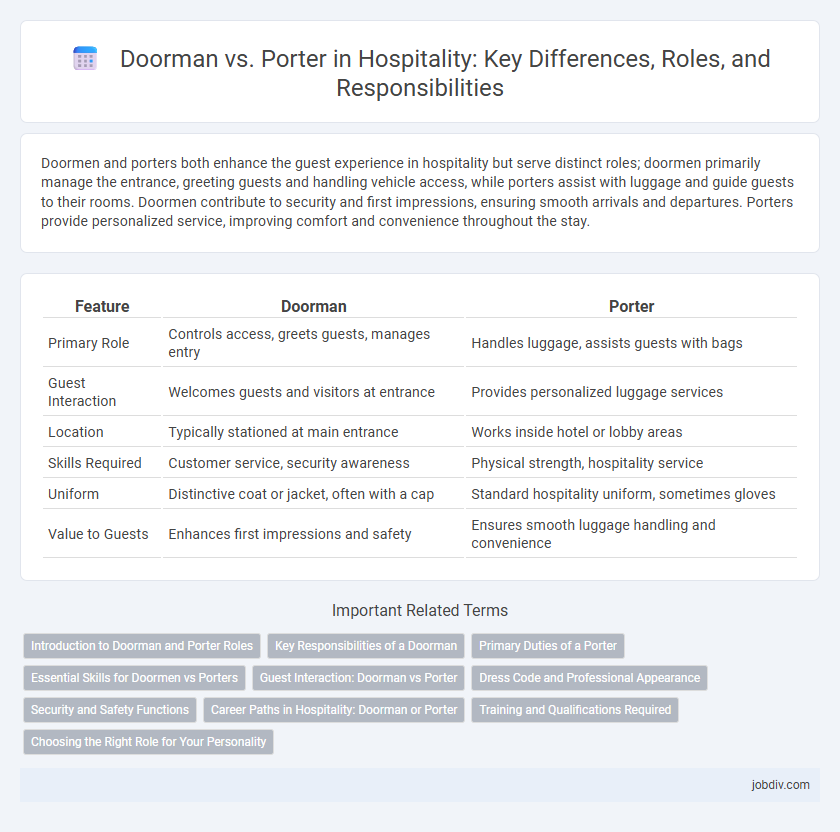Doormen and porters both enhance the guest experience in hospitality but serve distinct roles; doormen primarily manage the entrance, greeting guests and handling vehicle access, while porters assist with luggage and guide guests to their rooms. Doormen contribute to security and first impressions, ensuring smooth arrivals and departures. Porters provide personalized service, improving comfort and convenience throughout the stay.
Table of Comparison
| Feature | Doorman | Porter |
|---|---|---|
| Primary Role | Controls access, greets guests, manages entry | Handles luggage, assists guests with bags |
| Guest Interaction | Welcomes guests and visitors at entrance | Provides personalized luggage services |
| Location | Typically stationed at main entrance | Works inside hotel or lobby areas |
| Skills Required | Customer service, security awareness | Physical strength, hospitality service |
| Uniform | Distinctive coat or jacket, often with a cap | Standard hospitality uniform, sometimes gloves |
| Value to Guests | Enhances first impressions and safety | Ensures smooth luggage handling and convenience |
Introduction to Doorman and Porter Roles
Doormen serve as the initial point of contact in hospitality, greeting guests, assisting with luggage, and providing security at building entrances to enhance guest experience. Porters support guests by escorting them to their rooms, handling luggage transport, and offering assistance throughout their stay to ensure comfort and convenience. Both roles are essential for maintaining a welcoming atmosphere and smooth operations in hotels and luxury residences.
Key Responsibilities of a Doorman
Doormen primarily manage the entrance of hotels or residential buildings, ensuring guest safety and providing a welcoming first impression by opening doors and assisting with luggage. They monitor comings and goings, offer directions, and may hail taxis, enhancing guest convenience and security. Unlike porters who focus more on carrying luggage and room service assistance, doormen emphasize access control and guest interaction.
Primary Duties of a Porter
Porters primarily handle the transportation and delivery of guests' luggage, ensuring smooth movement from vehicle to room while maintaining a high standard of customer service. They assist guests with directions and general inquiries, enhancing the overall guest experience by providing personalized attention. Unlike doormen, who focus on greeting and opening doors, porters are essential in managing baggage and supporting guest needs throughout their stay.
Essential Skills for Doormen vs Porters
Doormen require exceptional interpersonal skills, keen observation, and the ability to manage security while greeting guests warmly. Porters must excel in physical strength, efficient luggage handling, and navigating the hotel layout swiftly to ensure seamless guest service. Both roles demand strong communication abilities, but doormen focus more on guest interaction and safety protocols, whereas porters prioritize logistical support and task coordination.
Guest Interaction: Doorman vs Porter
Doormen primarily engage with guests by greeting, opening doors, and assisting with arrivals and departures, creating a welcoming first impression. Porters focus on personalized guest interaction by handling luggage, escorting guests to rooms, and providing detailed local information. Both roles enhance guest experience but differ in scope and nature of direct contact.
Dress Code and Professional Appearance
Doormen in hospitality typically maintain a formal dress code, often wearing tailored uniforms such as suits or tuxedos paired with gloves and hats to project a polished and authoritative presence at hotel entrances. Porters usually wear practical yet professional uniforms designed for mobility and durability, such as branded polo shirts or button-down shirts with slacks, emphasizing comfort while maintaining a neat appearance. Both roles prioritize impeccable grooming and attention to detail to uphold the establishment's luxury image and ensure guests feel welcomed and valued.
Security and Safety Functions
Doormen primarily manage access control by monitoring entry points, verifying guests, and preventing unauthorized access to enhance security in hospitality settings. Porters focus on guest assistance and luggage handling, ensuring safety by maintaining clear pathways and promptly addressing potential hazards. Both roles contribute to overall security and safety, with doormen emphasizing surveillance and access management while porters support a secure and hazard-free environment.
Career Paths in Hospitality: Doorman or Porter
Doormen in hospitality often pursue career paths leading to concierge or guest services management due to their direct interaction with guests and responsibility for first impressions. Porters typically advance toward roles in housekeeping supervision or facilities management, leveraging their expertise in luggage handling and property maintenance. Both roles provide foundational skills essential for diverse hospitality management positions.
Training and Qualifications Required
Doorman positions in hospitality require extensive training in customer service, security protocols, and communication skills to ensure guest safety and a welcoming environment. Porters typically undergo specialized training in luggage handling, room preparation, and familiarity with hotel layout, emphasizing efficiency and care in guest support. Both roles demand a foundation in hospitality ethics and the ability to work collaboratively within the hotel team.
Choosing the Right Role for Your Personality
Doormen excel in roles requiring strong interpersonal skills and a friendly demeanor, as they are the first point of contact for guests and handle security aspects. Porters thrive in physically demanding tasks such as luggage handling and room deliveries, making them ideal for individuals who prefer active, behind-the-scenes work. Understanding your personality traits and strengths helps determine whether the social, security-focused role of a doorman or the service-oriented, physically intensive role of a porter is the best fit.
Doorman vs Porter Infographic

 jobdiv.com
jobdiv.com